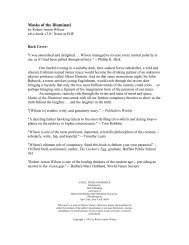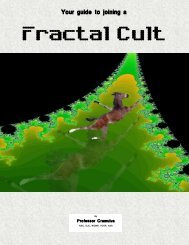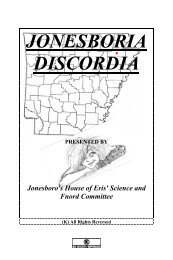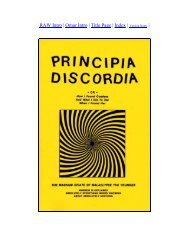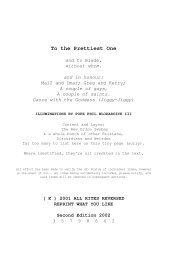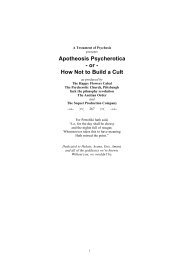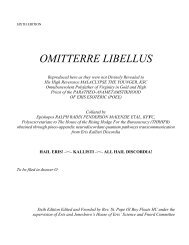Coincidance - Principia Discordia
Coincidance - Principia Discordia
Coincidance - Principia Discordia
Create successful ePaper yourself
Turn your PDF publications into a flip-book with our unique Google optimized e-Paper software.
COINCIDANCE 39<br />
YOUNG WITCH:<br />
Apples have been desired by you<br />
Since first in Paradise they grew;<br />
And I am moved with joy to know<br />
That such within my garden grow.<br />
Freud commented tersely on this exchange: "There is not the slightest<br />
doubt what is meant by the apple-tree and the apples." In fact, a nice<br />
apple-dumpling shop is Cockney slang for a pair of firmly rounded breasts.<br />
Some readers will be thinking of the Garden of Eden at this point, and<br />
they are probably right. It has long puzzled and provoked scholars that both<br />
Eve in that story, and the Goddess Eris in Greek mythology, are associated<br />
with apples and that the apples in both cases made a great deal of trouble. In<br />
the Hebrew story, Eve insists on eating a certain apple (actually, Genesis<br />
only says fruit, but tradition has always identified it with the apple), and<br />
Yahweh, the local volcano-god, is thrown into a fury and curses her and all<br />
mankind, for reasons that are far from perfectly clear. In the Greek story,<br />
Zeus slights Eris by not inviting her to a banquet on Olympus and she gets<br />
her revenge by manufacturing a golden apple inscribed KALLISTI ("To the<br />
prettiest one") and rolling it into the banquet hall. Immediately all the<br />
goddesses begin squabbling, each claiming to be the prettiest one and<br />
entitled to the apple; this quarrel worsens until men as well as gods are<br />
drawn into it and eventually the Trojan War results. Eris became known as<br />
the goddess of chaos and the golden apple is called the apple of discord.<br />
The similarities here—the role of the female, the presence of the apple,<br />
the sequence of supernatural calamaties—suggest that there might be a<br />
common origin to these myths. Such is indeed the case, according to Joseph<br />
Campbell's monumental four-volume study, The Masks of God. The Genesis<br />
text is very late and has altered the original myth to fit the patriarchal<br />
context of the religion of Yahweh. Originally, Eve was not Adam's wife, but<br />
his mother; she was not a human, but a goddess; and the outcome was not<br />
tragic, but triumphant—after the magic fruit was eaten, Adam himself<br />
became a god. (There is still a hint of this in the Genesis version, in which<br />
Yahweh says nervously, "Behold, the man has become as one of us [the<br />
gods], to know good and evil.") What was originally involved was probably a<br />
psychedelic sacrament, like the Eleusinian festival in Athens, in which the<br />
worshipers ate certain (hallucinogenic) foods and became one with the<br />
Mother Goddess Demeter. Eve and Eris, in short, are negative patriarchal<br />
versions of the bona dea (good goddess) of Rome, the earth-mother whose<br />
milk covers the sky at night, the Isis of Egypt, Ishtar of Babylon, the<br />
all-protective figure who has descended directly from the huge-breasted<br />
Veus of Willendorf—that numinous deity who is just an extension on the




